
- p12palof
- New Member
 Offline
Offline 
- From: Spain
- Registered: 24-2-2023
- Posts: 14
'57 Olympia SG1 from Germany
Hi there, I´m glad to present my new acquisition. I always loved the Standard typewriters instead the portables. I like the weight, space and the precise function of these machines. Due to the beauty and all the good feedback around the Olympia SG1, I always had the curiosity to test one.
Sadly, in Spain this model is very hard to find. You can find a lot of SG3, but rarely a SG1. And, if you have the luck of find one, probably it will be in very bad conditions.
Recently I have made a search in a popular classified ads German website (ebay kleinanzeigen) and I found this Olympia in a really good state. You can see the original pics from the seller: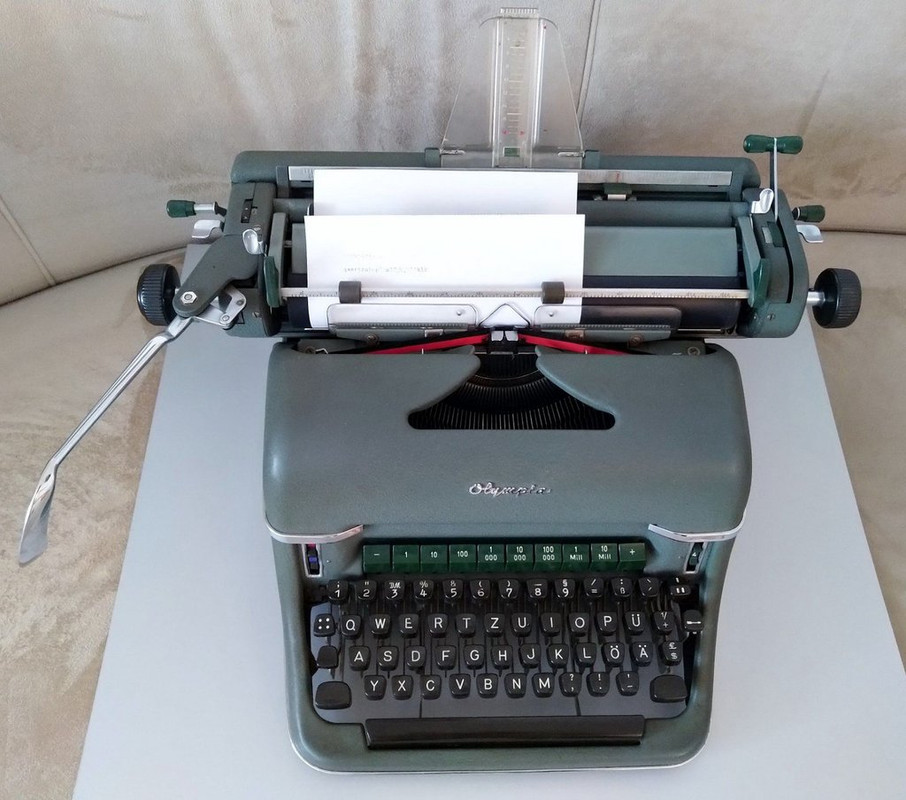
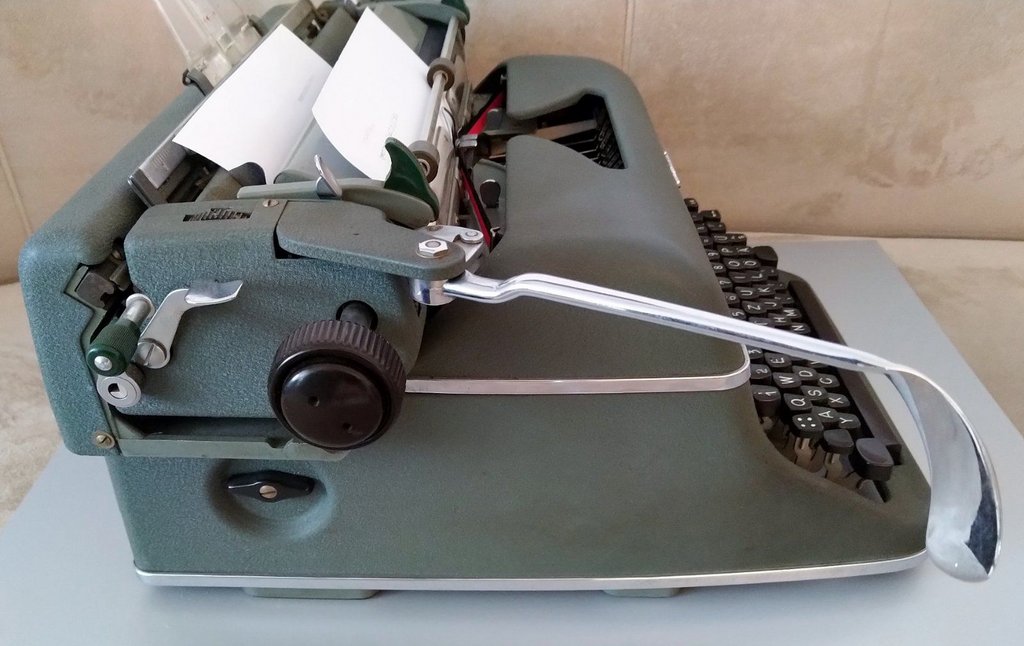
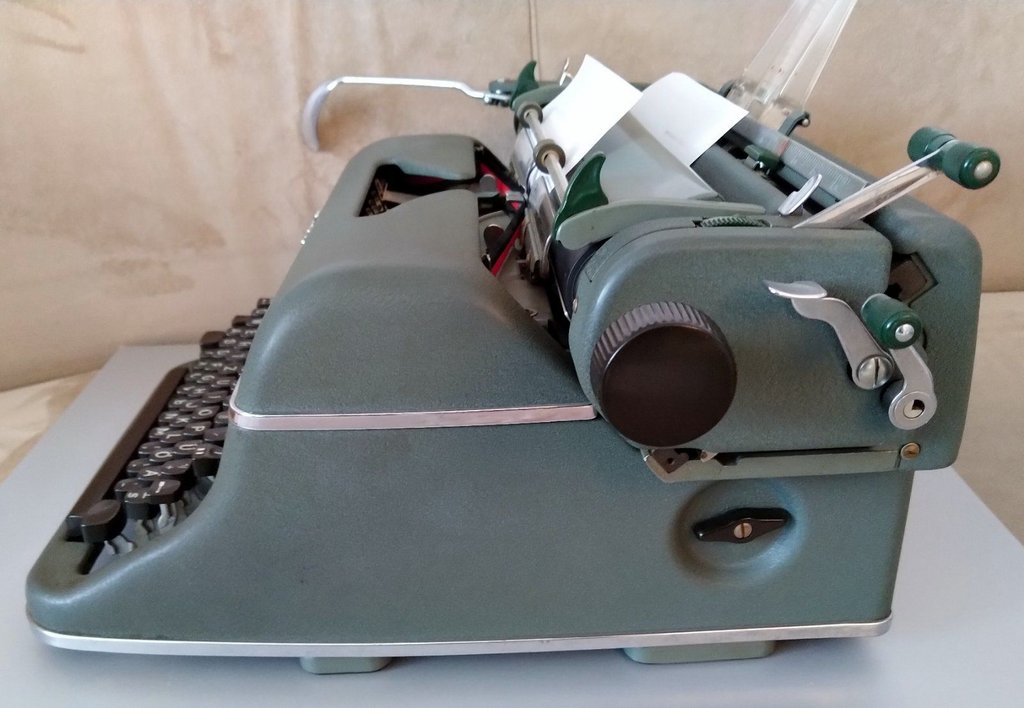
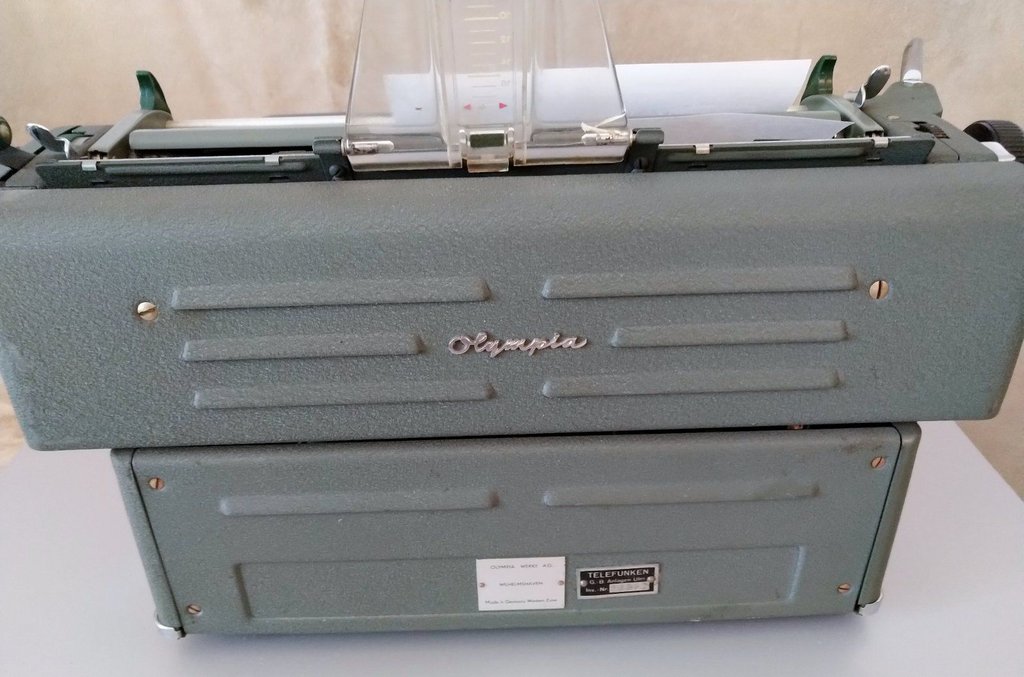

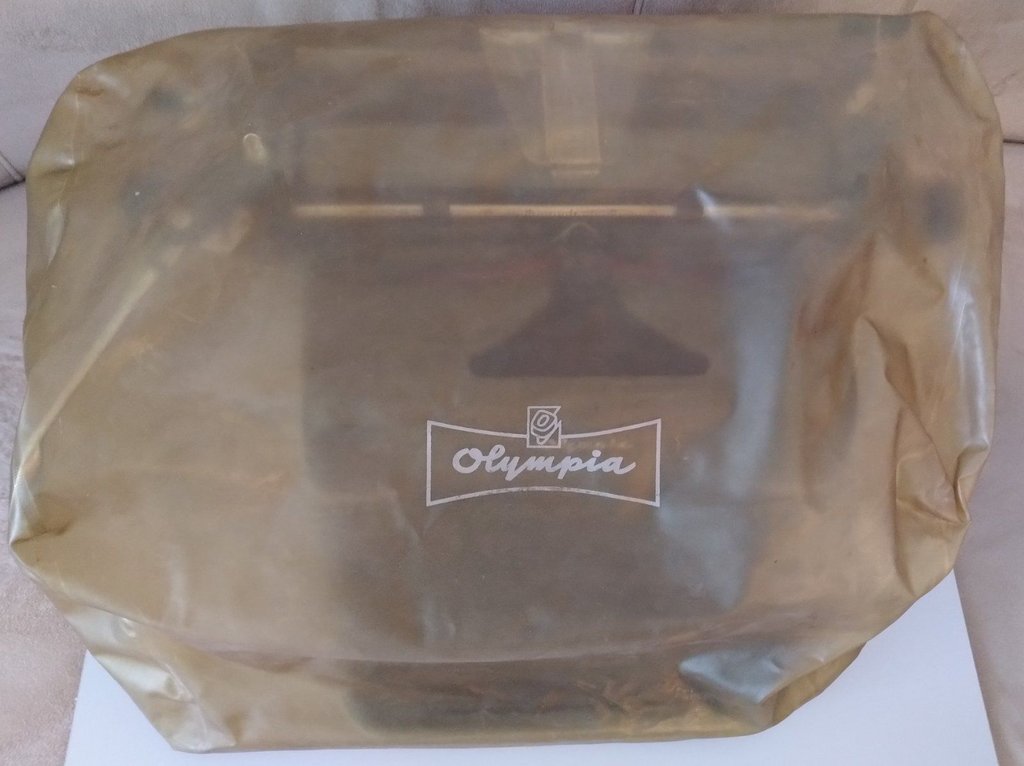
I was afraid to the fact of shipping this heavy machine, that would travel from several countries..., today I have received the package and I hace bittersweet feelings. Surprisingly the 99% of the machine is intact, except the papel injector lever that has been bent due to a heavy impact. I suppose that I can fix, disassemble it and try to straighten carefully. I can test this machine for a while and all I can say is that works very fine and the touch and feelings are very similar to a used Olivetti Linea 98 that I own. Perhaps the Olympia is a little softer but the precision and the progresion are very similar. The beauty is from another world....
- robmck
- Speed Champion
 Offline
Offline - From: Seattle, WA
- Registered: 31-1-2022
- Posts: 390
Re: '57 Olympia SG1 from Germany
Congratulations on your find!
It's a shame that the paper injector lever was bent, but from the photos, it looks like it should be able to be straightened easily.
I was surprised to find how much the touch on my SG-1 improved by giving the segment and linkage pivots a really, thorough cleaning, and tuning up the trip points. I ended up doing two passes, ending with a mixture of mineral spirits and sewing machine oil (10:1 ratio). Using it a lot helped, too. In fact, it may have trained me as much as I loosened up the typewriter: when I started writing on a Smith Corona 5 series after 4 months on the SG-1, I had to turn the touch control all the way up because I was pounding the keys.
- Pete E.
- Typewriter Talk Elite
 Offline
Offline 
- From: Idaho - USA
- Registered: 23-6-2020
- Posts: 2,556
Re: '57 Olympia SG1 from Germany
Since the carriage comes off very easily, it is better to ask (and maybe pay extra) the seller to ship such a machine in two (2) separate boxes.
The paper injector lever is usually pretty easy to bend back to its original position.
Congratulations on getting a nice SG1 !
- p12palof
- New Member
 Offline
Offline 
- From: Spain
- Registered: 24-2-2023
- Posts: 14
Re: '57 Olympia SG1 from Germany
Thanks for the comments!! Fortunately, the reparation of the lever have been very easy. It´s not 100% straight, but I don´t want to stress the material any more and it´s 100% functional and is moving free. This small residual bent will remain in the machine as a scar from the Germany-Spain trip.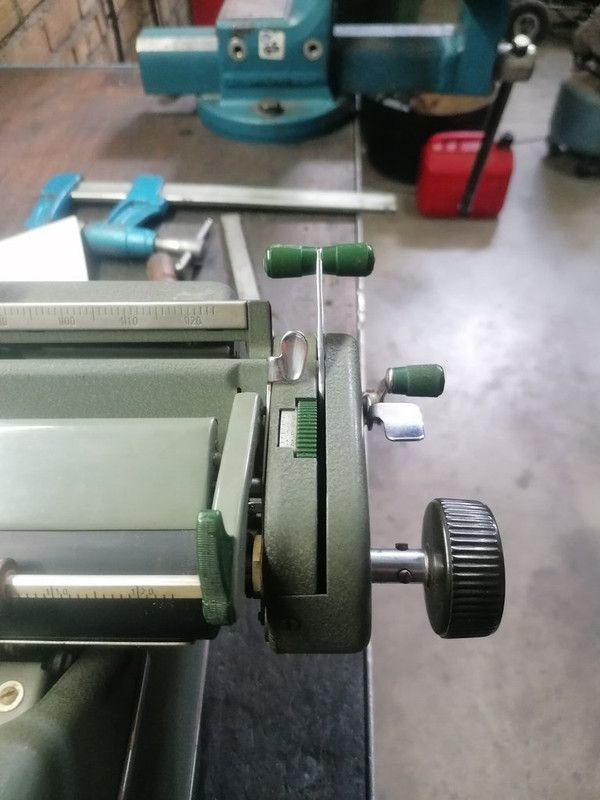
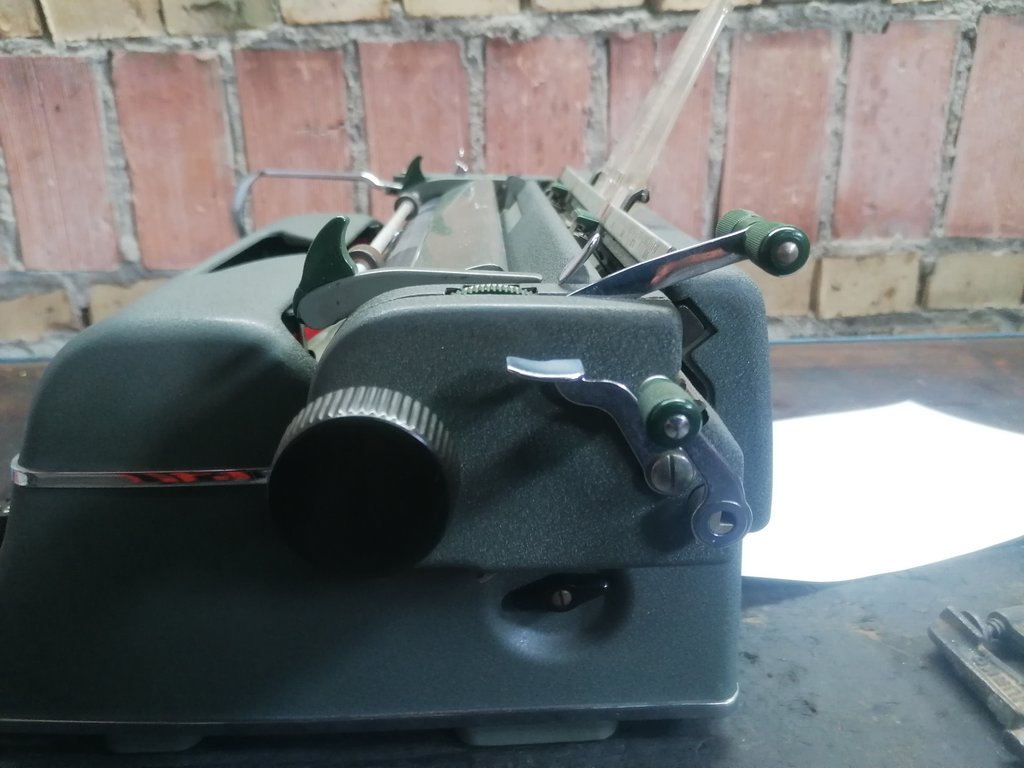
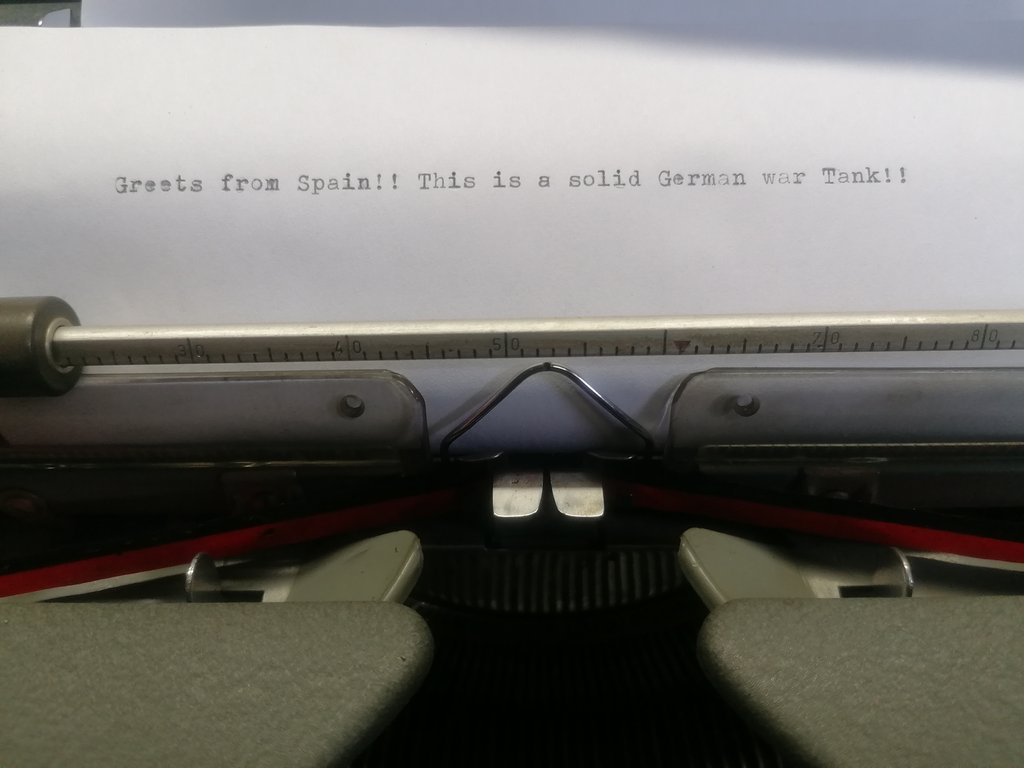
I have already tested the machine with peace of mind for a while, everything it´s perfect and loose and this antique is ready for a new life. You can see the machine face to face the Olivetti Línea 98. I have noticed that typing in the Olympia with the same strength than the Olivetti, I almost pierced the paper. And it´s not because the Olivetti is tougher, I believe the type bars in the Olympia are sharper.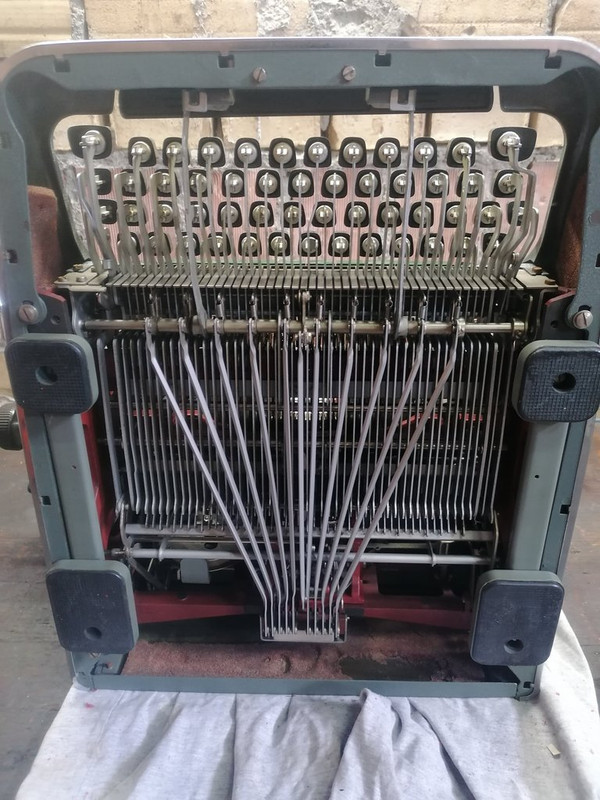

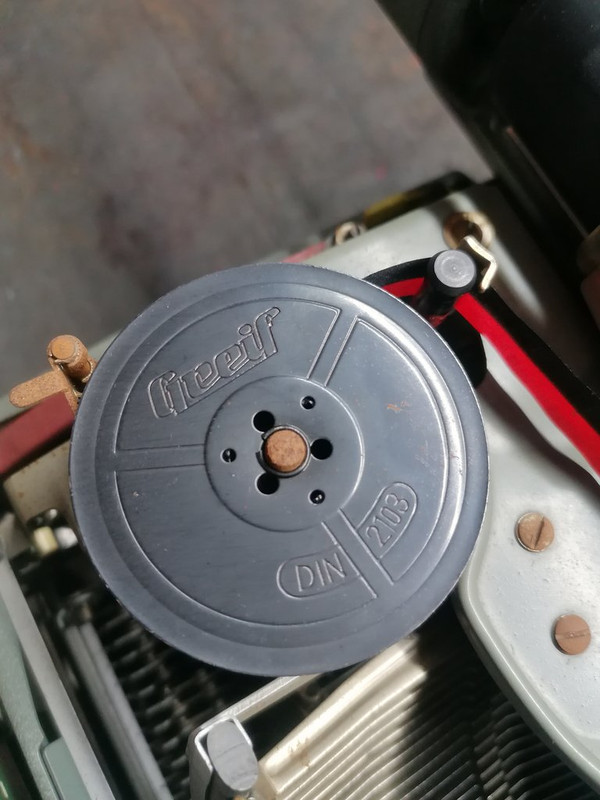
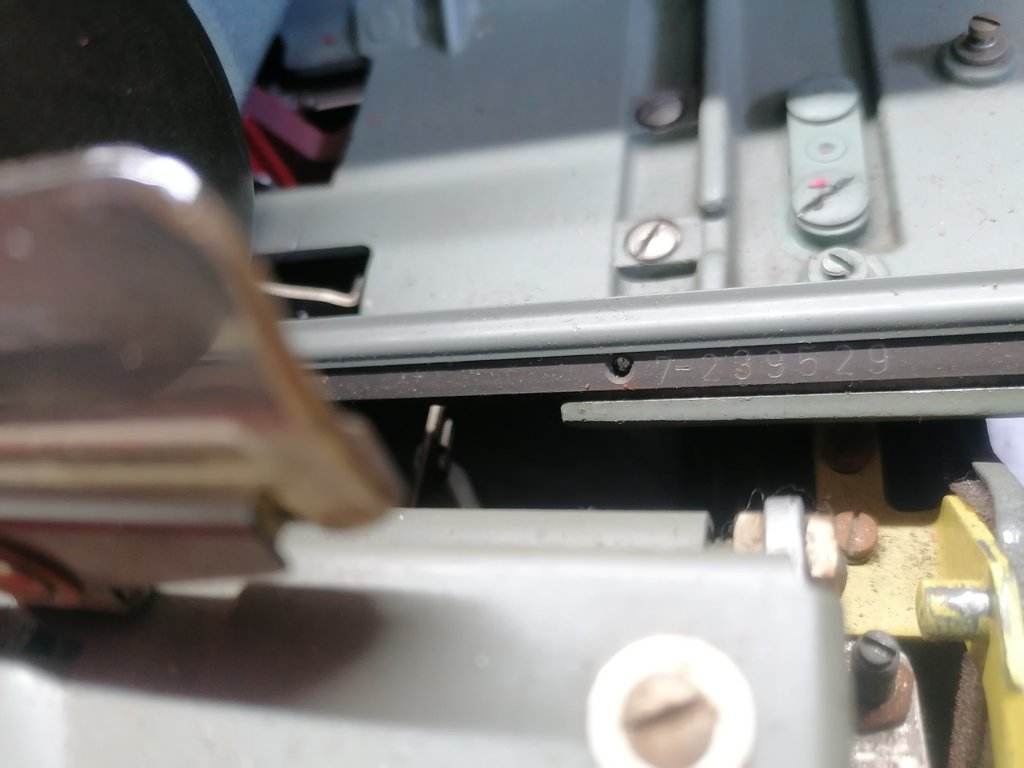
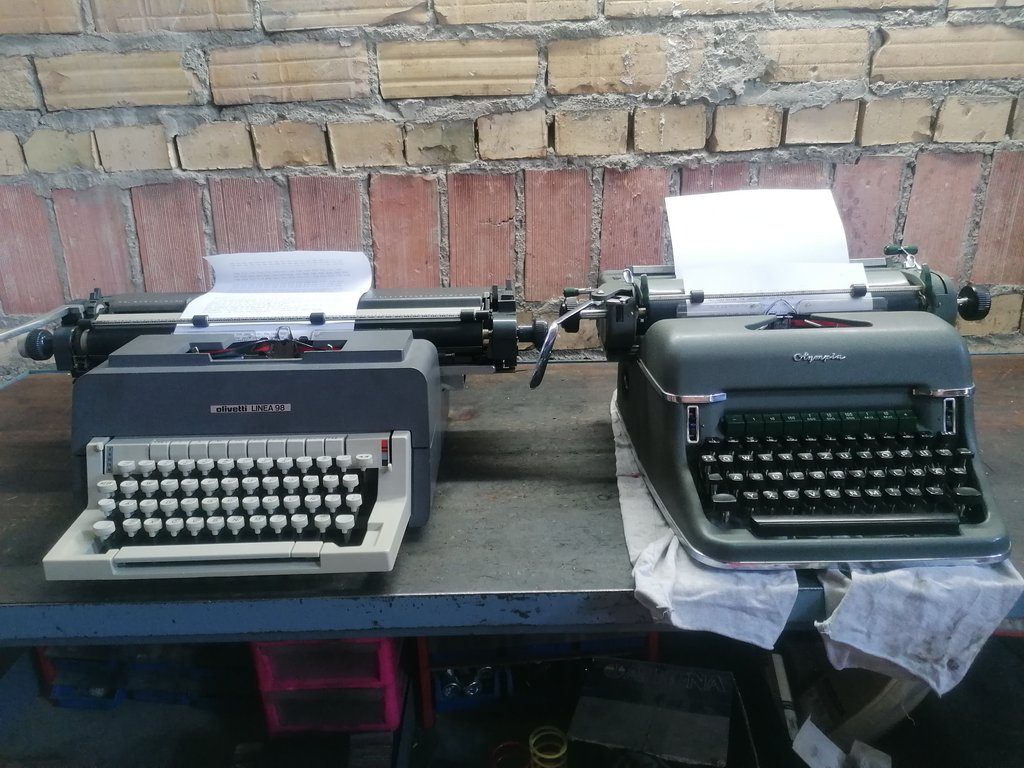
- •
- Pete E.
- Typewriter Talk Elite
 Offline
Offline 
- From: Idaho - USA
- Registered: 23-6-2020
- Posts: 2,556
Re: '57 Olympia SG1 from Germany
If your platen rubber is very hard...you might try some backing sheet with your typing paper.
If you are in the USA, look for this Avery product...softer laminating plastic sheet. I use it as backing paper for all my machines that have hard rubber. No punching holes in the paper, after that.
You might also adjust your "touch adjuster" so it does not have the type-slugs hit the platen so hard (if you haven't tried that, already).
.
- p12palof
- New Member
 Offline
Offline 
- From: Spain
- Registered: 24-2-2023
- Posts: 14
Re: '57 Olympia SG1 from Germany
robmck wrote:
Congratulations on your find!
...I was surprised to find how much the touch on my SG-1 improved by giving the segment and linkage pivots a really, thorough cleaning, and tuning up the trip points...
Excuse me robmck, I´m spanish and I´m not very acquainted in the english technical vocabulary about typewriters. By "segment and linkage pivots" I understand all the parts and mechanism between keys and type bars, am I correct? And I have no idea about the meaning of the sentence: "tuning up the trip points". Can you take me a picture of this work? Thanks for the tips.
Pete E. wrote:
If your platen rubber is very hard...you might try some backing sheet with your typing paper.
If you are in the USA, look for this Avery product...softer laminating plastic sheet. I use it as backing paper for all my machines that have hard rubber. No punching holes in the paper, after that.
You might also adjust your "touch adjuster" so it does not have the type-slugs hit the platen so hard (if you haven't tried that, already).
Thanks for the precise analysis of the problem, Pete. I'm not a top end typewritter user and I had 0 idea about the synthoms of a age hardened platen rubber... Yesterday I tried put the touch adjuster in the 8th level and the problem persisted.... I will try the plastic sheet. Thank you very much!!
- •
- Pete E.
- Typewriter Talk Elite
 Offline
Offline 
- From: Idaho - USA
- Registered: 23-6-2020
- Posts: 2,556
Re: '57 Olympia SG1 from Germany
Try setting the touch adjuster to "1"...which should result in the lightest strike. The higher the number, the heavier a strike results.
- robmck
- Speed Champion
 Offline
Offline - From: Seattle, WA
- Registered: 31-1-2022
- Posts: 390
Re: '57 Olympia SG1 from Germany
p12palof wrote:
robmck wrote:
Congratulations on your find!
...I was surprised to find how much the touch on my SG-1 improved by giving the segment and linkage pivots a really, thorough cleaning, and tuning up the trip points...Excuse me robmck, I´m spanish and I´m not very acquainted in the english technical vocabulary about typewriters. By "segment and linkage pivots" I understand all the parts and mechanism between keys and type bars, am I correct? And I have no idea about the meaning of the sentence: "tuning up the trip points". Can you take me a picture of this work? Thanks for the tips.
My apologies. The "segment" is the semi-circular part that all the type bars go into. It is the center piece in the diagram below:
The diagram below is a bit complex, but it shows the mechanism from the key cap (19) to the key bar (18), some links (17), and pivot (16), another linkage (14), and the type bar (which doesn't have a number). The segment is #35 in this diagram.
In these parts, any place there is movement between two parts, there is the possibility to slow the action of the keyboard. So, these are great places to concentrate cleaning with denatured alcohol, mineral spirits + oil, or in tough cases, strong solvents like PBlaster. Sometimes (as in my case), it takes multiple tries.
The above images are from the Olympia SG1 Typewriter Repair Bible edited by Ted Munk (The Typewriter Repair Bible Series). It's quite useful as it has the repair manual in it.
It's also interesting in another way – it also has the official sales manual, including example dialog:
"How do you do, Mr. Doe. My name is Smith. I am with the Acme Typewriter Company. We are the distributors of Olympia Typewriters for this area. I don't know whether or not you have ever seen an Olympia. If not, I am certain that you will be pleasantly surprised, as the Olympia is an entirely new office typewriter. It is economical to use, requiring very little service, and just as important it enables the user to increase
their productivity and to Operate at peak efficiency at all times."
Or:
"These spring tempered typebars (snap bar so that it vibrates) will always assure a perfect writing line alignment. The specially constructed escapement eliminates the possibility of crowding or piling typebars (type a line or two to illustrate alignment) and the responsive touch and action of the typewriter will enable the typist to turn out a quality of typewritten work that is unequaled by any other typewriter."
- p12palof
- New Member
 Offline
Offline 
- From: Spain
- Registered: 24-2-2023
- Posts: 14
Re: '57 Olympia SG1 from Germany
Thanks for the help and pictures. Apparently the typewriter was very clean, but this morning I disassembled the carriage, the external fairings, ... and carefully cleaned the segment and the linkage parts with the mixture of alcohol + oil. I also removed the rust present on many screws. Once the work is finished and the typewriter is assembled, after a few minutes of typing, I feel that we are recovering the full potential of this 66 years old machine.
Now I can affirm that the typing action of Olympia is better than Olivetti's Linea 98. Yesterday I still had my doubts, I hope that nobody kills me ![]() .More precision, less effort and more uniform resistance force between the central and external keys group. For example between the "a" key and "f" or "g" key. This is perhaps the only minor complaint that I have with the big Olivetti in comparison with the German machine.
.More precision, less effort and more uniform resistance force between the central and external keys group. For example between the "a" key and "f" or "g" key. This is perhaps the only minor complaint that I have with the big Olivetti in comparison with the German machine. 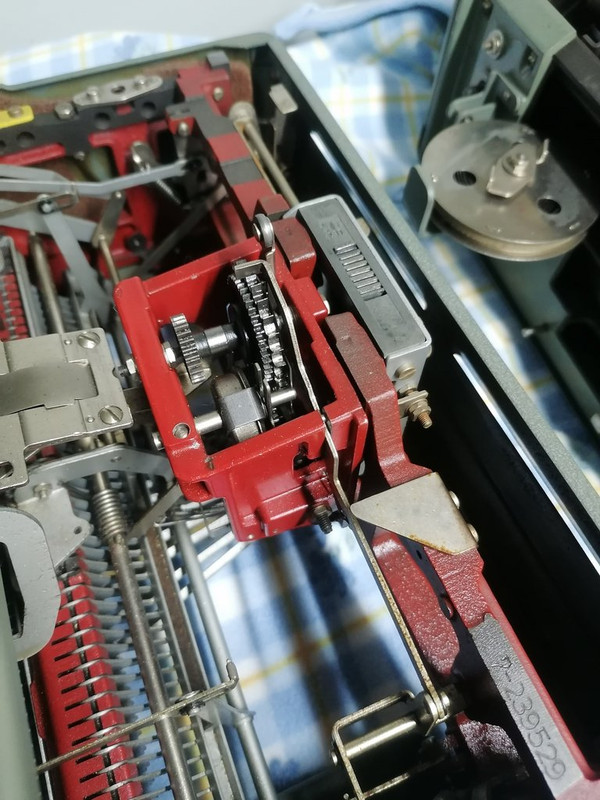
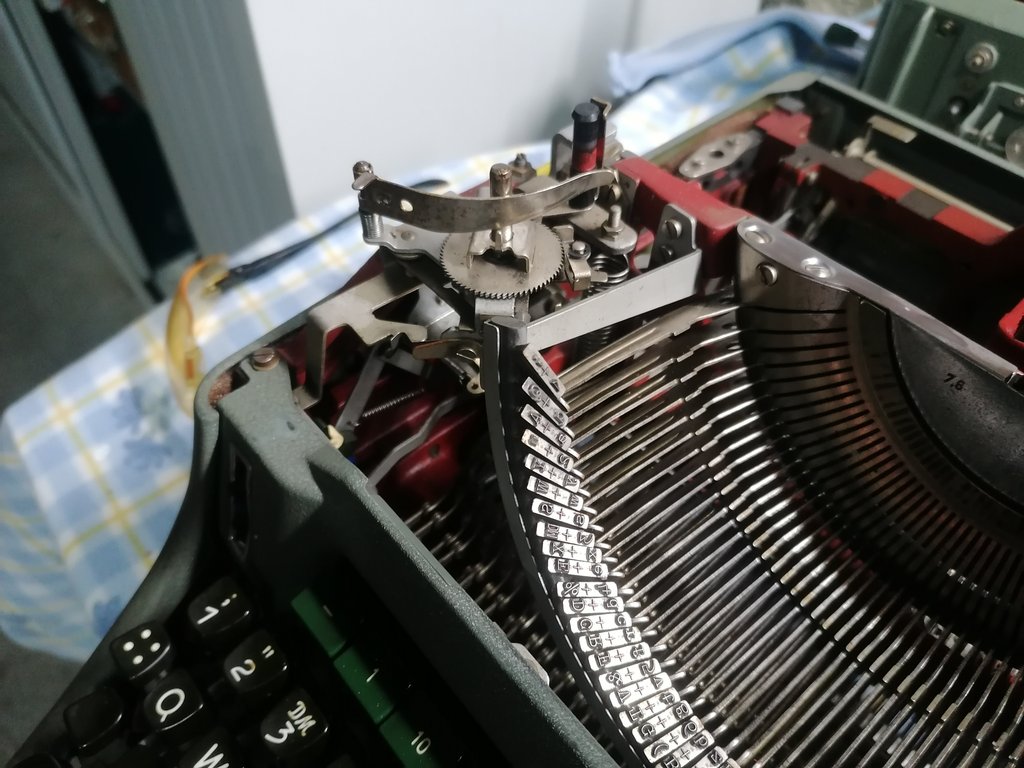
- •
- Pete E.
- Typewriter Talk Elite
 Offline
Offline 
- From: Idaho - USA
- Registered: 23-6-2020
- Posts: 2,556
Re: '57 Olympia SG1 from Germany
Th key-tops have cushion springs on each of their undersides. Many times these will be rusted/gunked up to the point where the spring does not depress when you strike a key-top.
I used PB Blaster to free mine up and then used denatured alcohol and my air compressor (to blow things dry) to get rid of the PB Blaster smell once it dissolved the rust. and gunk.
.

 1
1 